Bitcoin stands as a transformative force in the financial world, arguably the most recognized cryptocurrency today. At its core, Bitcoin promises a form of currency that operates independently from any centralized authority, rejecting the influence of traditional financial institutions like banks and government entities. This decentralization brings forth a peer-to-peer transaction model that proponents assert can free individuals from the constraints typically imposed by centralized financial systems. In an era where many individuals remain unbanked or underbanked, Bitcoin’s vision of financial freedom significantly alters the existing economic landscape.
While Bitcoin’s promise to empower individuals is well-documented, it is essential to recognize the criticisms that accompany its rise. Central banks, in particular, view the cryptocurrency with skepticism, as it directly threatens to undermine their traditional roles. The narrative surrounding Bitcoin is increasingly shaped by significant research efforts from financial institutions and policymakers. Over the past few years, the academic discourse has leaned towards exploring Bitcoin’s capacity to impact wealth distribution disproportionately, raising ethical questions about its nature.
In scrutinizing Bitcoin’s effect on financial equality, one report from the European Central Bank, penned after the FTX debacle, dubbed “Bitcoin’s Last Stand,” characterizes it as a failing financial experiment. Yet, ironically, less than two years later, the same researchers published a paper that depicted a more favorable outlook on Bitcoin following its resurgence in value. The dichotomy of these findings highlights the complexity of Bitcoin’s economic implications. Specifically, while Bitcoin can indeed create wealth, it seems that only a select group—namely, early adopters—reaps the full benefits. This situation raises concerns regarding the likelihood of increased inequality within society, where the gains of a few come at the expense of the many.
As the Bitcoin paradigm continues to evolve, its implications for government monetary policy come to the forefront. One interesting perspective emerges from statements made by the Minneapolis Federal Reserve suggesting that Bitcoin complicates a government’s ability to operate financial deficits. Traditionally, governments bolster their finances through bond issuance. However, with the emergence of Bitcoin as an alternative asset, governments might be limited in their spending capacity, dictated by their actual revenue generation.
This scenario presents two critical choices for authorities: either restrict Bitcoin’s adoption entirely or look to implement taxation on digital currency transactions. This recommendation aligns with the findings from the International Monetary Fund (IMF), which underscores the challenges posed by Bitcoin, particularly in emerging markets where policy frameworks may already be fragile.
Recent academic research across various central banks indicates a growing consensus that Bitcoin is reshaping the contours of modern finance. While the recommendations from these studies do not necessarily guide action from policymakers, they reflect a prevailing ambivalence towards this form of currency. The IMF’s recommendations involving anti-cryptocurrency measures in Argentina exemplify a trend where regulatory responses are increasingly seen as necessary to counter Bitcoin’s momentum.
The challenge lies in cultivating a coherent regulatory strategy that protects against the disruptive potential of Bitcoin, while simultaneously recognizing the value that financial innovation can bring to the broader economy. For many advocates of cryptocurrency, the ultimate goal is to foster a financial ecosystem that offers diverse options for users, promoting consumer choice and reducing reliance on traditional banking structures.
As we traverse the uncertain waters of digital currencies and their implications for economies worldwide, Bitcoin stands as both a beacon of hope for financial independence and a complex challenge for regulatory bodies. The dual nature of its impact—both empowering and potentially polarizing—suggests that the narrative surrounding Bitcoin is far from settled. The ongoing discourse will not only shape the financial landscape for years to come but also determine the future dynamics between traditional financial institutions and the rise of decentralized currencies. Understanding this relationship is paramount as we move toward a brave new world of finance marked by innovation, disruption, and, hopefully, inclusivity.



















Leave a Reply